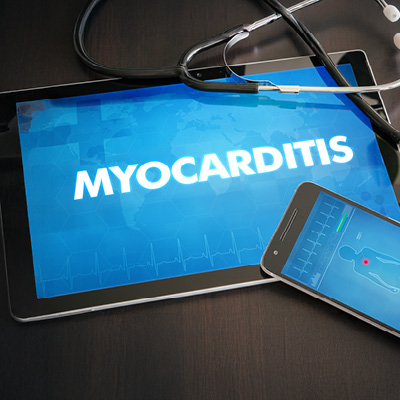Understanding Myocarditis After COVID-19
Posted May 12, 2025

As we continue to navigate the long-term effects of COVID-19, one condition that has raised concerns is myocarditis – an inflammation of the heart muscle. While rare, COVID-19-related myocarditis has been observed at significantly higher rates compared to pre-pandemic levels. Here’s what you need to know about how COVID-19 can affect the heart, its symptoms, risks and how to protect yourself.
How Does Myocarditis Affect the Body?
When you have myocarditis, your heart muscle becomes inflamed, which can interfere with its ability to pump blood effectively. This can lead to a range of complications depending on the severity of the inflammation, such as:
- Inflammation and Swelling – The heart muscle becomes irritated and swollen, which can weaken it.
- Reduced Heart Function – The heart struggles to pump blood efficiently, which can lead to fatigue and shortness of breath.
- Irregular Heartbeats (Arrhythmias) – Inflammation can disrupt the heart’s electrical signals, causing palpitations or abnormal rhythms.
- Chest Pain – Swelling in the heart muscle can cause pain similar to a heart attack.
- Fluid Buildup (Heart Failure) – In severe cases, the weakened heart can’t pump properly, leading to fluid buildup in the lungs, legs and other parts of the body.
- Risk of Clots and Stroke – Myocarditis can sometimes increase the risk of blood clots, which may lead to stroke or heart attack.
How Does COVID-19 Lead to Myocarditis?
Viral infections, including COVID-19, are a leading cause of myocarditis worldwide. The COVID-19 virus can enter heart cells, triggering inflammation and potential damage. In some cases, the immune system overreacts, releasing too many defense chemicals, which can make the inflammation worse.
Myocarditis from COVID-19 has symptoms similar to other forms of viral myocarditis. These can include chest pain and pressure, shortness of breath, palpitations, fatigue and fainting.
When Can Myocarditis Develop After COVID-19?
Myocarditis can develop days to months after a COVID-19 infection, with cases often detected between one to six months post-infection. While some cases may be asymptomatic, others may require medical intervention. Diagnosis typically involves an evaluation of symptoms, ECG tests, cardiac imaging (such as an MRI) and blood tests.
How Is COVID-19-Related Myocarditis Treated?
Currently, myocarditis from COVID-19 is treated the same way as other cases of myocarditis, following standard medical guidelines. This may include:
• Medications for heart function and reducing inflammation
• Rest and activity modification
• Individualized treatment approaches depending on symptom severity
While some patients recover without complications, more severe cases may require hospitalization and close monitoring.
Can Myocarditis Recur?
Yes, myocarditis can recur, particularly in those with a history of viral myocarditis. People who have had myocarditis are generally advised to wait at least six months before receiving a COVID-19 vaccination to reduce the risk of recurrence.
COVID-19 Vaccines and Myocarditis
Myocarditis after a COVID-19 vaccination is rare. When it does occur, it most often affects young males (ages 12–39) after the second dose. Studies show these cases are usually mild and short-lived, with most people making a full recovery.
What’s more, the benefits of vaccination far outweigh the risks – it helps prevent severe COVID-19 complications, including heart inflammation, and even offers heart-protective benefits. While vaccine-related myocarditis is typically mild, myocarditis from COVID-19 itself can be much more serious.
Staying Informed and Protected
While myocarditis remains a rare condition, understanding the risks associated with COVID-19 and its vaccines is crucial. If you have concerns about myocarditis, whether from infection or vaccination, talk with your healthcare provider. Being vigilant about heart health and getting vaccinated can help minimize risks and keep you protected in the long run.
Gabriela Orasanu, M.D., is director of advanced heart failure at Summa Health. To learn more about our heart and vascular services, visit summahealth.org/heart.
About the Author
Vitality eNews Sign Up
Receive the Summa Health eNewsletter for the latest health tips, advice and updates.


 Listen to this episode of the Healthy Vitals Podcast featuring Roger Chaffee, MD.
Listen to this episode of the Healthy Vitals Podcast featuring Roger Chaffee, MD.